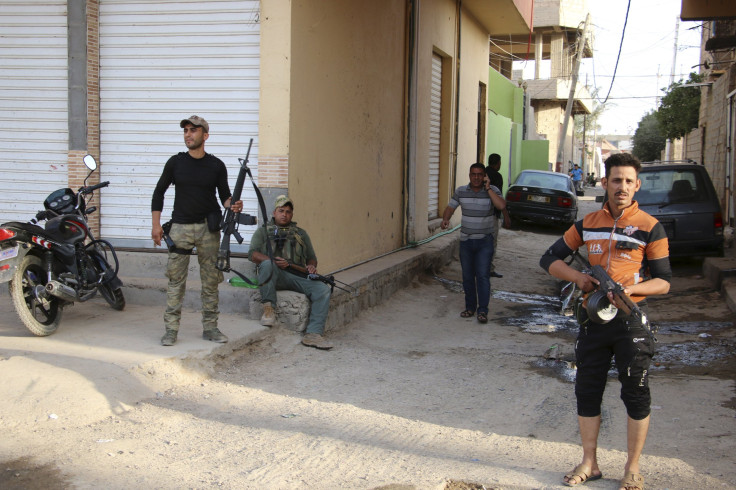Sunni Tribesmen Helped ISIS Take Control Of Ramadi, Leaders Say

ISTANBUL -- Some Sunni tribal leaders in Iraq’s Anbar province helped the Islamic State group take over the provincial capital Ramadi, officials in the city said in interviews with International Business Times. The tribal leaders provided the Sunni militant group with intelligence, cash and weapons that helped it defeat the U.S.-backed Iraqi military forces and gave it the upper hand in the battle. The Sunni militant group now controls an area stretching from the border of Syria, east to Mosul, Iraq's second-largest city, to the outskirts of Baghdad.
“There are some parts of the Sunni tribes, or certain members, that actually fought with ISIS,” said Sheik Aref Mukhbar Sayed Alwany, a Sunni tribal leader in Ramadi. “Others provided the group with moral and logistical support.” Alwany said the Sunni tribal leaders funneled cash to ISIS militants to help the group maintain its payments to volunteer fighters, and smuggled small arms, as well as ammunition, to the militants in Ramadi over the past four or five months.
The battle for Ramadi began last year. Each week, it seemed, ISIS would advance, and then fall back. The Sunni tribesmen and local police forces were fighting the Sunni militant group almost entirely on their own, with little help from Baghdad and what leaders said were "few and inefficient" U.S. airstrikes. For a while, despite the lack of support, the Sunni tribesmen stopped ISIS from taking the entire city, fighting the best way they knew how. They lined underground tunnels with explosive devices and detonated them when ISIS tried to advance. They fired rocket-propelled grenades at ISIS military outposts. And that seemed to be enough, Sunni fighters said.
But last week, ISIS made a push to completely wipe out its opposition. A large delivery of ammunition and small arms showed up in Ramadi city from ISIS supporters in Anbar, and the militants captured Ramadi.
The loss of Ramadi showed that ISIS was capable of snatching the upper hand in the battle against the U.S.-backed Iraqi army. "ISIS beat us to the punch," said Mike Knights, an expert on Iraq from the Washington Institute for Near East Policy, a think tank based in Washington.
"The U.S. played a shameful role. The U.S. promised us Ramadi would not fall," said Hathal al Fahdawi, a member of Anbar's provincial council, referring to private meetings Sunni fighters had with American officials in Iraq. But the forces in Ramadi were not trained well, Fahdawi said, and many, after learning of the support some Sunni tribesmen were giving to ISIS, gave up hope that they would ever come out on top.
"The government did not pay the salaries for these fighters for more than four months," Fahdawi said. "Plus the government gave no support or reinforcements and no weapons or ammunition."
Anbar province is predominantly inhabited by Sunni tribes and is governed by Sunni families that have amassed money and prestige over several decades. The Islamic State group is also Sunni, a sect of Islam that differs from the Shiite-dominated Iraqi government. Many of the men fighting the Islamic State group in the region were part of the U.S. “Sunni Awakening” strategy in 2007 that funneled arms to Sunni tribes in western Iraq to stop al Qaeda. The U.S. tried to implement a similar strategy against ISIS and enlisted tribal leaders to lead the fight against the Sunni militant group using American weapons. But that strategy fell apart because the weapons the U.S. promised never made it into the hands of the tribes in Anbar, leaders told IBTimes. The Sunni tribes were outgunned by ISIS, and now we know that was happening also because the Sunni militant group was being supported from within the province.
Alwany said Sunni tribes did not just support ISIS in Ramadi, but also provided support to ISIS militants in Kabisa, a town located just west of Ramadi near the Ain al Asad air base, where U.S. military advisors are training Iraqi soldiers.
“The Sunni tribes in Anbar are highly susceptible to intimidation by ISIS. They back the wrong horse sometimes,” said Knights. “Some of their relatives are hidden in ISIS prisons and their business practices are dominated by ISIS in some ways.”
Sheikh Ali Hatem al-Suleiman, the leader of one of the largest Sunni tribes in Anbar, the Dulaim, is said to be working directly with the Islamic State group, Anbar tribal leaders told IBTimes. Al Suleiman has been an active opponent of the Iraqi government, especially when Nouri al Maliki, a Shiite, was prime minister between 2006 and 2014.
Several other Sunni leaders from Anbar have been linked to al Suleiman's work with ISIS, and several arrest warrants have been issued by the Anbar police. These Sunni tribal leaders are not only able to acquire weapons to give to ISIS but can also send money by working with wealthy Sunni businessmen such as Khamis al-Khanjar and Imad Mohammadi, who previously gave financial support to anti-government demonstrators in several parts of Iraq.
The Sunni leaders' deliveries to ISIS could impact the U.S.-led coalition's fight against the Sunni militant group in the future, analysts said, because it is difficult to know which tribes to trust.
"If you were an intelligence agency thinking about if someone was susceptible to recruitment, the answer would be that [the tribesmen] are all very susceptible," Knights said.
While the Iraqi military and Shiite volunteer fighters scramble to position themselves to retake lost ground in Anbar, the U.S. is preparing to send emergency shipments of weapons to aid the fight.
The U.S. is sending 1,000 anti-tank missiles to Iraq in addition to what it had previously pledged, the New York Times reported Wednesday. Prime Minister Haider al Abadi requested the transfer of the weapons during a meeting in Washington last month. Yet the missiles will not arrive in Iraq until sometime in June, the Times reported.
© Copyright IBTimes 2024. All rights reserved.











